NYC Public Advocate Candidates Respond to First-Ever Arts Ed Questionnaire
Three of the four Democratic candidates for the Office of New York City Public Advocate who have responded to a candidate questionnaire expressed deep concern about the overemphasis on standardized testing and test preparation, and a resultant narrowing of curriculum in city public schools, and are calling on the New York City Department of Education (NYCDOE) to take proactive steps to support greater access to arts education.
Responding to a questionnaire circulated to all of the candidates in the contested Democratic priMary For Public Advocate by The Center for Arts Education (CAE), candidates Bill de Blasio, Mark Green and Norman Siegel signaled that current trends in public schools are reducing time for arts education and other subjects, and that they would call on the NYCDOE to reinstate a minimum amount of guaranteed funding for arts education in every public school. Eric Gioia did not address the testing issue, or express support for dedicated funding.
Richard Kessler, executive director of CAE, was impressed with the candidates' grasp of the challenges facing the school system and commented that "The fact that these candidates are unequivocal in their support for greater access to arts education, and in many ways are rethinking how we educate the city's 1.1 million school children, is a very positive sign. The arts are an essential part of a quality education, and as Public Advocate -- a job which provides a citywide platform for monitoring municipal government -- these candidates could help usher in important changes that will benefit public schools across the city."
As described on the web site of the outgoing Public Advocate, Betsy Gotbaum, who has been a strong advocate of arts education, "the Public Advocate answers complaints about people's problems with city government, investigates ineffective agencies and programs, proposes solutions that make government more efficient, and helps communities gain better access to government."
Candidate de Blasio: "We must constantly reevaluate testing, its impact on student learning, and how we can work to achieve a curriculum that is balanced and does not cut critical area like arts, music and other creative pursuits...The DOE should be leading [the] effort to ensure that all New York City public schools are providing every student with the arts education curriculum that will help them to be creative thinkers and engaged students."
Candidate Green: "We must ensure that the Department of Education complies with...New York State Education Law which mandates arts education." He continued, "We should bring back Project Arts. By investing in a strong arts program we can create a new generation of more creative and innovative New Yorkers, strengthening our City economically and culturally, and [giving] our children a more fully rounded education."
Candidate Siegel: "I have heard from far too many parents that our schools increasingly overemphasize standardized testing. I would set up a task force and public hearings to look in to this allegation, since it is substantial... Teaching to the test may improve the surface appearance of city schools by boosting students' scores, but no approach to education should forget that our goal is not test scores, but rather teaching children how to express themselves and think critically...I fear that evaluating our schools based almost entirely on standardized testing creates incentive for school officials to deemphasize aspects of education such as the arts where success isn't as directly reflected by test results."
Candidate Gioia: "For too long, the education debate reform has been hampered by an excessive focus on issues that don't move our schools forward. We must move beyond political posturing to focus on the issues that enable learning, increase graduation rates, and lead to better student achievement."
All four candidates supported the following policy measures to address the shortage of arts learning opportunities in a great number of New York City public schools:
* New York City Department of Education led remediation efforts or other interventions for schools found to be out of compliance with state arts education requirements
* Inclusion of a wider array of factors, such as data from the Annual Arts in Schools Report, school compliance with state education requirements, and other in the school Progress Reports
* Creation of a citywide task force to examine access to arts education offerings in city public schools
The candidates' completed questionnaire responses are posted online at:
www.caenyc.org/public-advocate-survey
Doug Israel, Director of Research and Policy for CAE, said, "The near obsession with statewide exams is short-sighted. We need to reinvigorate education with robust course offerings, teaching that grabs students' attention and makes them sit up in their seats. The arts provide that essential part of the school day and these candidates get it. That's a start."
About The Center for Arts Education
The Center for Arts Education (CAE) is leading the effort to restore quality arts education for each of New York City's more than one million children in public schools. CAE provides tools and resources to deliver quality arts learning for all children, through innovative teaching and learning programs that help build arts-infused school communities. Advocacy initiatives educate policymakers and the public about the value of arts education as an essential ingredient in a quality education and a fundamental part of children's overall health and well-being. Visit www.caenyc.org to learn more, contribute and get involved.
Videos
